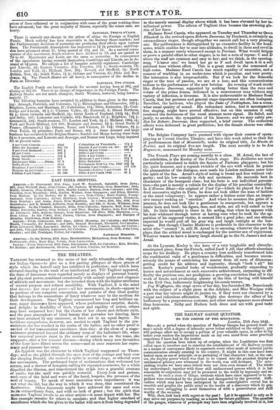THE THEATRES.
TAGLIONI has returned to the scene of her early triumphs—the stage of our Italian Opera—to give us a few parting glimpses of those graces of style which she herself only has exhibited in perfection; and which have elevated dancing to the rank of an intellectual art. Till Taglioni appeared, the feats of dansenses were regarded merely as displays of personal beauty And physical power, combined occasionally with animal spirits and elegance of attitude and movement: but she invested them with the higher attributes of mental purpose and refined sensibility. With Taglioni, it is the mind that dances: her steps and poses—all her movements, in short—appear to be portions of one complete conception, and partake of that ideal quality that belongs to the emanations of fancy whatever may be the medium for their development. Since Taglioni commenced her long and brilliant ca- reer, many danseuses have appeared, whose performances surprise, dazzle, and delight: in flexibility of limb, vigour and rapidity of action, others may have surpassed her; but the charm of her chaste and delicate style, and the pure atmosphere of ideal beauty that pervades her dancing, have not been attained by any successor, at least not in an equal degree. No invidious comparisons, however, are needed to exalt Taglioni to the pre- eminence she has reached in the realm of the ballet; and no other proof is needed of her transcendent excellence than this: at the close of a stage- existence protracted beyond the ordinary term of the ballerine's life, when
• her corporeal powers must in the course of nature be on the wane, she reappears, after a few seasons' absence—during which many new favourites of the hour have flitted across the scene—and at once reasserts her supre- macy and resumes her sway.
La Sylphide was the character in which Taglioni reappeared on Thurs- day; and as she glided through the open door of the cottage and bent over the sleeping Donald, she seemed a sprite in mortal shape, so etherial were -her movements. The prolonged burst of acclamations that welcomed her return, and a shower of bouquets calling for repeated courtesies, for a while dispelled the illusion, and transformed the sylph into a graceful creature of earth; but the spell was quickly restored. Every look and gesture, each turn of the head and wave of the hand, bespoke the presence of the soul of beauty. To speak of mere execution were impertinent: it was not what she did, but the way in which it was done, that constituted the fascination. Other dansenses might have achieved the same and even 3ncro extraordinary feats, and with no lack of grace ; but the spirit that sinimnes Taglioni dwells in no other artiste—it must depart with her. Her fine example remains for others to emulate; and that higher standard of excellence which she has given to the ballet will save it from being degraded to the merely sensual display above which it has been elevated by her in- tellectual power. The adieux of Taglioni thus beoome the crowning glo- ries of her fame.
Madame Rossi Caccia, who appeared on Tuesday and Thursday as Queen Elizabeth in the revived opera Roberto Devereux, by Donizetti, is certainly an extraordinary singer, though altogether we cannot call her a very pleasing one. Her performance is distinguished by an excessive facility in the head- notes, which enables her to soar into altitudes, to dwell in them and revelin them, in a manner rarely witnessed except in Persiani. What would fatigue or prove a painful effort to other singers, is to her a note of repose: C and D above the staff are common and easy to her; and we think, in the opening- song, " L'amor suo," we heard her go to F and dwell upon it in a soft subdued tone without effort. This is a great merit in the command of high notes. Madame Rossi Caccia has much rapidity of execution, and a manner of warbling in an under-tone which is peculiar, and very pretty. Her intonation is also irreproachable. But if we look for the dramatic singer or the tone of passion, we are at a loss; and this communicates tedium to the performance of the new heroine. An evening of weak music like Roberto Deuereux, supported by nothing better than the runs and veleta of the prima donna, delivered in a monotonous tone without any variety of inflection, is tiresome. It is also unfavourable to Madame Road Caccia, that her gestures and general stage-deportment are often inelegant. Baroilhet, the baritone, who played the Duke of Nottingham, has a some- what nasal quality of sound. His redundant action, had it accompanied fine singing, might have proved effective; but on this occasion it only rendered the feebleness of the vocal attempt more signal. He failed, and justly, to awaken the sympathies of his hearers: and we may safely pre- dict for Roberto Devereux, thus supported, a brief career. The orchestral effects were delivered in great perfection; but the female chorus was often out of tune.


























 Previous page
Previous page